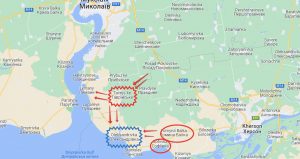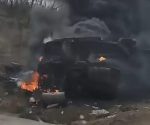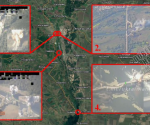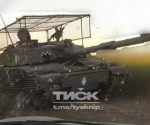Briton fighting for the anti-Russian axis in Ukraine is killed: what it might tell us
In March there was one of the first of what would become many devastating Russian attacks on Ukrainian facilities used to store weapons and/or house military personnel so that the anti-Russian forces assembled in Ukraine would take a serious blow in one fell swoop with no material loss caused to the other side (except for the expenditure of the weaponry that delivers the carnage). What is being referred to, of course, is the cruise missiles strike on the Yavorov base, which this site covered to point out the significance of Russia attacking a complex so intrinsically linked with NATO and the preparations for Ukraine’s invasion of the Donbas – embodied somewhat by the death of three so-called “ex-servicemen” who were declared by a Ukrainian government official to have been actual serving members of the UK armed forces attendant at the base as training instructors (find links at the foot of the page).
That this was the case, argued the author at the time, was indicated by there being no fuss made in UK corporate-media of these dead men; there was no elevating them into heroes in the defence of democracy, all of them salt of the earth working men, not unaffected by some already existing minor tragedy in their lives (for the purposes of provoking the sort sympathy that can generate cash donations) which had inspired them to dedicate time to good causes, ultimately with the good cause of Ukraine having brought about their demise – with families now having to face the loss of a husband or son, slaughtered by the evil Putin. This is how an opportunity would surely not have been lost to provoke hatred of Russia by Mi7 (i.e. corporate-media) should they have been permitted to pay ludicrous tribute in their propaganda outlets. Indeed, this was noted by the author at the time:
That Mi7 is absolutely quiet on the subject of “heroic” civilian wannabes from the UK being dead and injured from this attack, despite it being a great propaganda opportunity, points to the British victims being serving military.
As things have transpired, there is now an actual case of this eulogizing of a “victimised” British combatant, because on 28th April news emerged of the death of one Scott Sibley, supposedly a volunteer in the anti-Russian axis in Ukraine:
A former member of the Armed Forces who is the first British national killed in Ukraine “showed Commando spirit until the end”, his former regiment has said.
Scott Sibley, a devoted father from Northumberland, was praised as the “bravest person” by friends and family on Thursday night who remembered his “contagious laugh”.
The 36-year-old was killed during fighting in Mykolaiv and the Foreign Office has confirmed that a second British man is missing.
Mr Sibley leaves behind a young daughter Charlotte-Rose, who has been suffering from a rare form of cancer that mostly affects young children. He had devoted much of his time to raising money for his charities that had helped his family.
Here we see all the lionisation we might have expected. An “ex” soldier in logistics attached to the Royal Marines, Sibley is praised by the regiment he previously served in. He is lauded by friends for courageousness, and his society is fondly recalled. Not only is he a family man, he is a devoted one, even more so because he had a sick daughter so that, as a result, he campaigned for the charities which battled with her illness.
In a properly sane country, the author would suggest, if Sibley did not receive outright condemnation from an independent press that was tuned in to a moral compass, then the least that should have been afforded the man was to acknowledge that his fate was self-inflicted and represented a bad choice. As it is, however, UK corporate-media is dictated to by UK Government, being a part of its military intelligence capability as it is, and the death must be used for propaganda purposes.
On the contrary, with nothing of this sort being produced when the three “ex-servicemen” were killed at Yavorov, it is with a good deal certainty that it can be said that these were indeed actively serving troops. Indeed, the coverage of Sibley’s death serves to remind of the contrast in treatment, because Sibley is consistently called the first Briton to be confirmed as having died, and if there is reference to why the qualification is needed, it is to treat the other deaths as rumour. Here’s an example from the BBC:
Three former members of UK special forces were reportedly killed in March during a Russian missile attack on a military training centre near the border with Poland – but this was never confirmed.
This sort of mention by the BBC is what a previously recorded matter of fact looks like before it is entirely consigned to the memory hole tubes and to the furnaces in the basements of the Ministry of Truth. Very soon indeed the stipulation of confirmation of death won’t be required when Sibley’s is talked about, and the story of three Britons dead at Yavorov won’t make it to the history books. And here’s the small difference between them: although the Foreign Office was reported as investigating the three deaths, it apparently didn’t ultimately acknowledge them as having happened. However, the Foreign Office is not the final arbiter on reality, and it doesn’t depend on whether or not the Foreign Office deigns something to be the case or not.
Now, the obvious thing to understand about the difference in treatment between the cases is that, on the face of it, Sibley’s death is safe to publicise and propagandise because of how he appears to have been entirely in Ukraine of his own volition and not ordered, or organised to it by UK Government†. However, this might be too simple a way of understanding. It is perhaps better to say that Sibley was in Ukraine in a way that afforded plausible deniability.
Before this discussion continues any further, a few things should be made plainer. This is the output of a Telegraph live news feed at 5.03pm, on 28th April:
A British man who was killed fighting in Ukraine has been named as armed forces veteran Scott Sibley.
A second British man has also been reported missing.
The Foreign Office did not provide any details on when the individual had died and when the other had gone missing.
A spokesman said: “We can confirm that a British national has been killed in Ukraine and are supporting their family”.
On the second individual, they added: “We are aware of a British national who is missing in Ukraine and are supporting their family. We are urgently seeking further information.”
A GoFundMe page has been set up in Mr Sibley’s memory.
First of all, it appears that the Foreign Office did not release Scott Sibley’s name, but an ok was given for it to be known in the public domain, whereas the same was not given for another individual who it looks like is known to have lost contact with whomever knows about his presence in Ukraine. It appears that everything we additionally know about Sibley and the other man in terms of their being in Ukraine (the least of which is that both were combatants in the anti-Russian axis) has been established by Mi7 elaborative accounts stemming from “diplomatic sources”, or “another Briton on the ground”, or “military sources operating in the war zone”.
Reading between the lines, the author would suggest that the information about the demise and disappearance of these two men comes directly to UK Government from its Ukrainian counterpart, or through a channel that UK Government might have with the Ukrainian defence ministry, or most likely of all, a semi-official UK component embedded in the command of Ukrainian forces. The author suggests that a back-door release of Scott Sibley’s name was permitted, whether it was that friends and family were allowed to let it be known on social media, or whether it came from those sources mentioned above into the province of corporate-media, so that fund raising efforts could begin. You see, reader, after long observation of these things, event sceptics are suspicious that crowd funding campaigns have become a way to compensate the families of victims of false flag terror – and therefore effect a pay off without there needing to be the production of over-the-counter payments and any paper trail that goes with it. In this way, relatives are mollified and do not cause trouble nor ask difficult questions.
On the other hand, the reason why the release of the identity of the second man is not okayed is presumably because it is a matter of some sensitivity, or he would be put at more risk in his current predicament if it was made known. The fact of the control of this information for these reasons speaks of that line of communication discussed above to indicate UK insertion into Ukrainian command and control, and there is nothing in any of this that dissuades the author from thinking that when anti-Russian combatants in Ukraine from the UK are not paid mercenaries (one way or another), they are still organised by UK Government.
Of course, it should occur to anyone who has paused to think, if the identity of the second man is not publicly revealed, what is the point of announcing the fact of a disappearance? One answer is that the intention is to influence Russian actions – for instance, by telegraphing that a particular Briton who may be in Russian captivity (because that is as good a reason as any for losing contact with this individual) is supposed to remain anonymous‡.
This way of thinking is come about by noticing that the other sources used by corporate-media in its coverage of the Sibley death mostly agree that he was in Mykolaiv, which is the oblast neighbouring Kherson to the north and west (each having capital cities of the same name), and also that he was killed on Saturday 23rd. This then, with the unnamed soldier being associated with Sibley through the same announcement, suggests that the contact was lost in the same place and at the same time.
And fascinatingly, in a development that might be related, on Tuesday 26th the Russians announced that they had captured the Kherson oblast in its entirety, and also parts of Mykolaiv (also called Nikolaev). The timing is such that it could be that Sibley was killed, and the other man went missing, during this fighting after which the Russians could make that announcement. Moreover, an example of their progress was given when, overnight on the 26th/27th, a film was released by the Russian Ministry of Defence that showed drone footage of a fortified Ukrainian position that had been abandoned, and with dead bodies strewn about the location. Although the author cannot verify that it is true, he has seen it claimed that this film would be the first time the Russian MoD had officially released material showing Ukrainian dead (although there is tons of such like material on the internet, apparently it is unofficial; i.e. not released by the Russian MoD). The location of this position is said to be Aleksandrovka – and the reader can see where this is by observing the map below (stolen from Southfront.org); Aleksandrovka is circled in blue.
Now consider this extract from a Guardian article of March 14th:
Senkevych was a businessman elected in a suit in 2015 after the Euromaidan revolution; the youngest mayor in Ukraine, praised for fighting corruption. Now, with more than 1,500 Russian units of military equipment brought from the occupied Crimea surrounding the town from the east and north, he is a war leader. The Russians have already occupied some of the villages 20km away. Only the Pivdennyi Buh river that divides Mykolaiv saves it from blockade, but the Russians may soon build a pontoon bridge to the north to close the circle.
It is key to Moscow’s aspirations, for by controlling Mykolaiv, Moscow would be able to approach Odesa, 80 miles to its west, and then the Ukrainian land border up to Transnistria – the breakaway republic of Moldova. “The only road from Mykolaiv is to Odesa – it is our lifeline, that’s how we’re evacuating people,” he tells me.
The Pivdennyi Buh is the river shown in the graphic, above. Of course, the article is now more than a month old, and the Russians have withdrawn from the positions described in it – evidently a large prong northwards on the east of the river was a feint. Since then, however, Russian positions to the south of Mykolaiv and north of the river that runs through Kherson have been consolidated. That being said, it’s not hard to imagine that the river port is not going to feature in Russian plans given the advantage of its location, as the extract clearly discusses.
The author’s intuition tells him that there is a picture of the depth and organisation and actuality of UK involvement that is yet to be manifested, but will come if the Russians do have it in their plans to push into Mykolaiv and into a strata of anti-Russian defence in that region and down to Odessa disposed in anticipation of a Russian assault (this area, after all, is where UK Government’s dream of a Ukrainian port on the Black Sea entertaining the Royal Navy clings to life). Since the interest here at this site is to make sense of how much UK Government’s capability to terrorise British civilians at home is diminished by Russia’s making waste of the assets that would otherwise do it, one cannot help but wonder, in a climate where the Russians have declared a concernment for what they have hinted at as a disguised UK military presence in Ukraine, if there is significance in the release of the abovementioned film as it might relate to the announcement by the Foreign Office of Britons dead and missing.
†It would entail too much of a loss of prestige if UK Government were to admit that actively serving military personnel had been killed in the manner they had at Yavarov. As explained before in these pages, since – according to many Russian statements – all foreign troops are going to be treated as criminals, Russia would probably accept a UK admission, with excuses made for men gone absent without leave, without it blowing up into an incident that could lead to direct conflict.
‡ An Andrew Hill, from Plymouth, whose being in Russian captivity came to the attention of UK corporate-media yesterday because of an interrogation aired (allegedly) on Russian television, need not be this missing Briton. Indeed, there has been no sign of an official conformation from UK Government that the two are one and the same. Notably, though, Hill was captured in Mykolaiv.
The Attack On The Yavorov International Peacekeeping And Security Centre; Part One: Without Thought Or Fear Of US/UK Retaliation (link).
The Attack On The Yavorov International Peacekeeping And Security Centre; Part Two: Making Waste Of US/UK “Capabilities” (link)




















Government by hoax does not apply to government war propaganda then.
It doesn’t matter what is in the article when there’s a disrupting talking point to ply, then? Relying on people not to read it, but skip to the comments, then?
Well, to accommodate these people: in the body of this article it was said that UK Government (-by-hoax) propagandised the death of a “volunteer” to “provoke hatred of Russia” by lionising him. The publicity, we should suspect, also triggered a tried and trusted pay-off mechanism.
Moreover, in the body of this article it was said that the announcement of the death provided propagandists an opportunity to relegate the deaths of three actively serving City of London mercenaries (i.e. members of UK Armed Forces) to a state of being unremembered.
Now, “Craig”, if people can’t get above a certain level of sophistication, whereby if someone isn’t photoshopping a head onto someone else’s body to create the impression of a fake war then it isn’t government war propaganda, then there’s plenty of alternative media that services that sort of thing (and after all, there’s a great moronic demand).
At this site (which I pay for out of my own pocket and is not a pay-rolled toilet bowl of the internet for anyone – especially not public relations operatives – to come along and crap in), after I have spent a great deal of time researching and writing an article that notes significant Russian (particularly problematic for the UK) gains, and concludes by suggesting an expectation of the revelation of greater official UK interference in Ukraine as more gains (in particular areas) are achieved, for reasons that should be self-evident (I’ve wasted enough time already) comments underneath it that propose the notion of fake UK fighters, for instance, are not going to be permitted.
“then there’s plenty of alternative media that services that sort of thing (and after all, there’s a great moronic demand)”
That describes THIS SITE quite well…
This article alone is full of nothing but half-facts and stretches are absolutely ridiculous, not to mention absolute fabrications….
MI7 (not Mi7) was “quiet” because they were DISBANDED in 1918 after WWI !
A former RLC soldier who probably wasn’t “Attached” … He probably attended the All Arms Commando Course. Ran by the RM and open to ALL branches of the UK military.
The second guy is not named… beacuase he is MISSING, not confirmed dead… This is not because of some military “Sensitivity” but because that is British LAW for the press.
“Reading between the lines”…
You mean “Making shit up as I go” don’t you.? “P W Laurie”
The fact you guys published this confirms for me you do NOT have a clue about the world. you just seem to be an anti british mouthpiece.
“peter benson”; I think this must be your first visit, but it’s with great interest I notice you comment on a piece that has been attracting a lot of attention of a particular type that THIS SITE is unaccustomed to. I’m going to go ahead and publish you, because you require a public swatting off (and it’s not hard to do).
Just to put you right, there is no “you guys”, and no “mouthpiece”. On the contrary, I am very much clued up about the City of London’s illegitimate rule over England and against that (and, after all, what is “british” after the superficial symbolism for control is broken down [and why are you guys so inconsistent with your capital letters†]?).
In further response,
1) Yes, they do say Mi7 was DISBANDED, don’t they? I say that’s NOT the case. If you were a long time reader, “peter benson”, or if you were interested in finding out why the term was used, you might have come across such articles as Lessons From Nineteen Eighty Four: Military Intelligence Government, And Corporate-Media As Mi7 (link) where some explanation is given (I can’t do it every time). If you came here just to leave a comment on this article, then of course there’ll be no telling you.
2) It’s you using the word “probably” in conjunction with Sibley’s service, indicating that you don’t know. I merely read Mi7’s coverage:
“Scott Sibley had served in Afghanistan with the elite Royal Marines’ Commando Logistics Support Squadron” – The Star
“A veteran of Afghanistan, the 36-year-old [Sibley] previously served with the elite Royal Marines’ Commando Logistics Support Squadron.” – The Sun
“Mr Sibley, 36, from north-east Lincolnshire, previously served in Afghanistan as a member of a specialist logistics unit attached to the Royal Marines.” – Scottish Daily Mail (pressreader)
3) Officially, the MISSING fighter is rogue, so why shouldn’t he be named? I’m going to check into this LAW whereby a Briton abroad by his own volition (according to the narrative) and who disappears there can’t be named, and if I find it (which I am not expecting to) I will update this comment. It would have helped if you had provided evidence, because otherwise it qualifies for making shit up as you go along.
I think sensitivity is exactly the word to use. I think that the whole issue of UK Government-organised fighters, Queen’s mercenaries or otherwise, getting their (superior) arses handed to them in Ukraine is highly damaging, not especially in terms of causing international embarrassment, but because of the way ability to exert control domestically has to be detrimentally affected – which is a statement aimed at regular FBEL readers, “peter benson” – who needn’t bother writing a reply – won’t have done the back-reading so that he could appreciate it.
† Like others this week, this commenter made his submission without capitalising his “own name”. It appears capitalised on this page above the comment because this is how the CSS automatically presents the text.